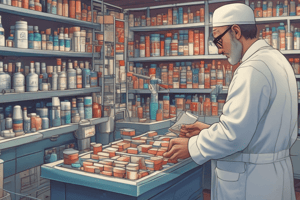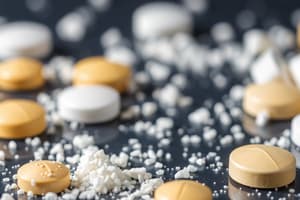Podcast
Questions and Answers
Tablets are the least stable dosage form compared to others.
Tablets are the least stable dosage form compared to others.
False (B)
What percentage of all dosage forms do tablets and capsules comprise?
What percentage of all dosage forms do tablets and capsules comprise?
- 80% (correct)
- 70%
- 60%
- 50%
What is a key advantage of tablets regarding drug release?
What is a key advantage of tablets regarding drug release?
Tablets can be formulated to release the drug at a particular site within the gastrointestinal tract.
One disadvantage of tablets is that their manufacture requires many steps of operation, leading to increased product loss, known as __________.
One disadvantage of tablets is that their manufacture requires many steps of operation, leading to increased product loss, known as __________.
Match the type of tablet with its characteristics:
Match the type of tablet with its characteristics:
Which of the following is an advantage of tablets?
Which of the following is an advantage of tablets?
The compression of all drugs is uniform and does not present any manufacturing issues.
The compression of all drugs is uniform and does not present any manufacturing issues.
Name one type of tablet that helps in administering medication to those who have difficulty swallowing.
Name one type of tablet that helps in administering medication to those who have difficulty swallowing.
Which Eudragit is soluble in intestinal fluids from pH 5.5?
Which Eudragit is soluble in intestinal fluids from pH 5.5?
Film coated tablets are primarily used to mask the taste of the drug.
Film coated tablets are primarily used to mask the taste of the drug.
What is the main purpose of chewable tablets?
What is the main purpose of chewable tablets?
Effervescent tablets disintegrate in the presence of ________.
Effervescent tablets disintegrate in the presence of ________.
What is the primary role of microcrystalline cellulose in pharmaceutical formulations?
What is the primary role of microcrystalline cellulose in pharmaceutical formulations?
What are the drawbacks of sugar coated tablets?
What are the drawbacks of sugar coated tablets?
Lactose monohydrate is only available in one grade.
Lactose monohydrate is only available in one grade.
Match the following tablet types with their characteristics:
Match the following tablet types with their characteristics:
What is used as a diluent primarily for chewable tablets?
What is used as a diluent primarily for chewable tablets?
What type of binder are starch, sucrose, and gelatin classified as?
What type of binder are starch, sucrose, and gelatin classified as?
Eudragit RS and RL are soluble in water.
Eudragit RS and RL are soluble in water.
What is the main component responsible for the disintegration of effervescent tablets?
What is the main component responsible for the disintegration of effervescent tablets?
Match the following excipients with their characteristics:
Match the following excipients with their characteristics:
Which of the following is an example of a dry binder?
Which of the following is an example of a dry binder?
Spray dried lactose consists of 80-90% crystalline α-lactose monohydrate.
Spray dried lactose consists of 80-90% crystalline α-lactose monohydrate.
_____ is a polysaccharide used as a diluent, binder, and disintegrant.
_____ is a polysaccharide used as a diluent, binder, and disintegrant.
What is the primary function of disintegrants in tablet formulation?
What is the primary function of disintegrants in tablet formulation?
Lubricants are added in the initial mixing stage of the tablet formulation.
Lubricants are added in the initial mixing stage of the tablet formulation.
Name two examples of disintegrants used in tablet formulation.
Name two examples of disintegrants used in tablet formulation.
Disintegrants exert sufficient mechanical pressure within the tablet to cause it to break apart into small segments upon entry into the __________.
Disintegrants exert sufficient mechanical pressure within the tablet to cause it to break apart into small segments upon entry into the __________.
Match the following components with their primary roles in tablet formulation:
Match the following components with their primary roles in tablet formulation:
How does excess lubricant affect tablet performance?
How does excess lubricant affect tablet performance?
Disintegrants should be mixed with insoluble lubricants to improve wettability.
Disintegrants should be mixed with insoluble lubricants to improve wettability.
The concentration of binders in tablet formulations usually ranges from __________ percent.
The concentration of binders in tablet formulations usually ranges from __________ percent.
Which of the following is a soluble lubricant used in tablet formulation?
Which of the following is a soluble lubricant used in tablet formulation?
Glidants are added in high concentrations to improve tablet disintegration.
Glidants are added in high concentrations to improve tablet disintegration.
What is the purpose of sweetening agents in tablet formulations?
What is the purpose of sweetening agents in tablet formulations?
The primary purpose of colors in tablet formulation is to improve the __________ of the product.
The primary purpose of colors in tablet formulation is to improve the __________ of the product.
Match the following excipients with their primary functions:
Match the following excipients with their primary functions:
Flashcards are hidden until you start studying
Study Notes
Tablets as Dosage Forms
- Tablets constitute approximately 80% of all dosage forms.
- They are commonly used for systemic drug delivery.
- A tablet is a compressed unit dosage form containing one or more drugs, along with excipients, in a defined shape.
Advantages of Tablets
- Convenient and aesthetically pleasing dosage form.
- Available in various types offering different drug release rates and durations of action.
- Formulation allows for targeted drug release within the gastrointestinal tract (GIT).
- Can contain multiple drugs despite potential incompatibilities.
- Suitable for oral administration of various therapeutic agents.
- Easier to mask unpleasant tastes through coating.
- Generally less expensive compared to other dosage forms.
- Tablets are more chemically, physically, and microbiologically stable than other dosage forms.
Disadvantages of Tablets
- Tablet manufacturing requires numerous steps, leading to potential product loss during production.
- Drug absorption from tablets is influenced by individual physiological factors like gastric emptying rate, resulting in patient variability.
- Some drugs are difficult to compress, potentially causing manufacturing issues.
- Administration to children and elderly individuals can be challenging due to swallowing difficulties.
Types of Tablets
- Conventional Compressed Tablets (C.T.): Designed for rapid disintegration and drug release; constitute a significant portion of clinically used tablets.
- Sugar Coated Tablets (S.C.T.): Conventional tablets coated with a concentrated sugar solution for enhanced appearance or taste masking.
- Film Coated Tablets (F.C.T.): Conventional tablets coated with a polymer or polymer mixture; can be designed for non-enteric (dissolving in the stomach) or enteric (controlled release) drug delivery.
- Chewable Tablets: Chewed in the mouth before swallowing; ideal for children, adults with swallowing difficulties, and antacid formulations.
- Effervescent Tablets: Rapidly disintegrate in aqueous solutions with effervescence, producing a drug solution or suspension; the chemical reaction between components generates carbon dioxide (CO2).
Important Tablet Excipients
- Diluents: Fillers that increase tablet volume; examples include microcrystalline cellulose (Avicel®), anhydrous lactose, lactose monohydrate, spray-dried lactose, and starch.
- Binders: Hold powder particles together in wet granulation and granules together during compression; common examples include starch, sucrose, gelatin, microcrystalline cellulose, and cross-linked polyvinylpyrrolidone (PVP).
- Disintegrants: Facilitate tablet breakdown in the stomach to enhance drug absorption; often hydrophilic polymers like sodium starch glycolate, croscarmelose sodium.
- Lubricants: Reduce friction during tablet ejection from the die; insoluble lubricants like magnesium stearate and stearic acid are widely used; soluble lubricants like polyethylene glycols (PEGs) and sodium lauryl sulfate may be used to improve disintegration.
- Glidants: Improve powder flow properties; examples include talc and colloidal silicon dioxide.
Miscellaneous Excipients
- Adsorbents: Used for absorbing liquid or semisolid components within the tablet formulation; examples include magnesium oxide or carbonate, kaolin, and bentonite.
- Sweetening Agents/Flavors: Improve tablet taste and acceptability, particularly in chewable tablets; employed when drug components have unpleasant taste.
- Colors: Enhance tablet appearance and facilitate product identification; water-soluble colors are often added to the wet granulation liquid for uniform distribution.
- Surface Active Agents: Improve wettability of hydrophobic tablets, increasing disintegration rate; also enhance solubility of poorly soluble drugs in the GIT, accelerating tablet dissolution.
Studying That Suits You
Use AI to generate personalized quizzes and flashcards to suit your learning preferences.




